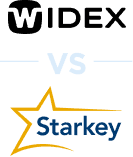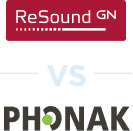Starkey vs. ReSound Hearing Aids: Our Hands-On Comparison
After evaluating both hearing aid brands, we found that ReSound hearing aids provide exceptional sound clarity and connectivity features. Meanwhile, Starkey stands out with its health tracking capabilities and AI-driven sound processing. Both brands require professional fittings and typically cost several thousand dollars per pair, placing them firmly in the premium hearing aid category.
Starkey and ReSound both deliver outstanding hearing aids with distinct strengths that rival the best hearing aids we’ve tested. That said, the better choice for you will come down to factors such as hearing loss severity, technological preferences, and which features you prioritize. Let’s take a closer look and compare Starkey and Resound.
Key Findings
- ReSound pioneered universal Bluetooth connectivity and continues to lead with Auracast technology, allowing users to receive audio broadcasts directly from public venues.
- Starkey's Edge AI and Genesis AI models feature health tracking capabilities, including fall detection and physical activity monitoring, features not available with ReSound devices.
- ReSound hearing aids typically cost between $2,800 and $6,358 per pair, while Starkey devices, for their premium models, range from $3,000 to $6,000 per pair.
- Starkey offers more extensive tinnitus management solutions, including a dedicated Tinnitus Calmer app and integrated masking features.
- ReSound performs better in challenging listening environments through its AI-driven processing, significantly reducing listening fatigue.
FYI: Both Starkey and ReSound are premium hearing aid brands with higher price points. For more affordable alternatives starting at under $500 per pair, check our guide to this year's best cheap hearing aids.
Starkey vs. ReSound
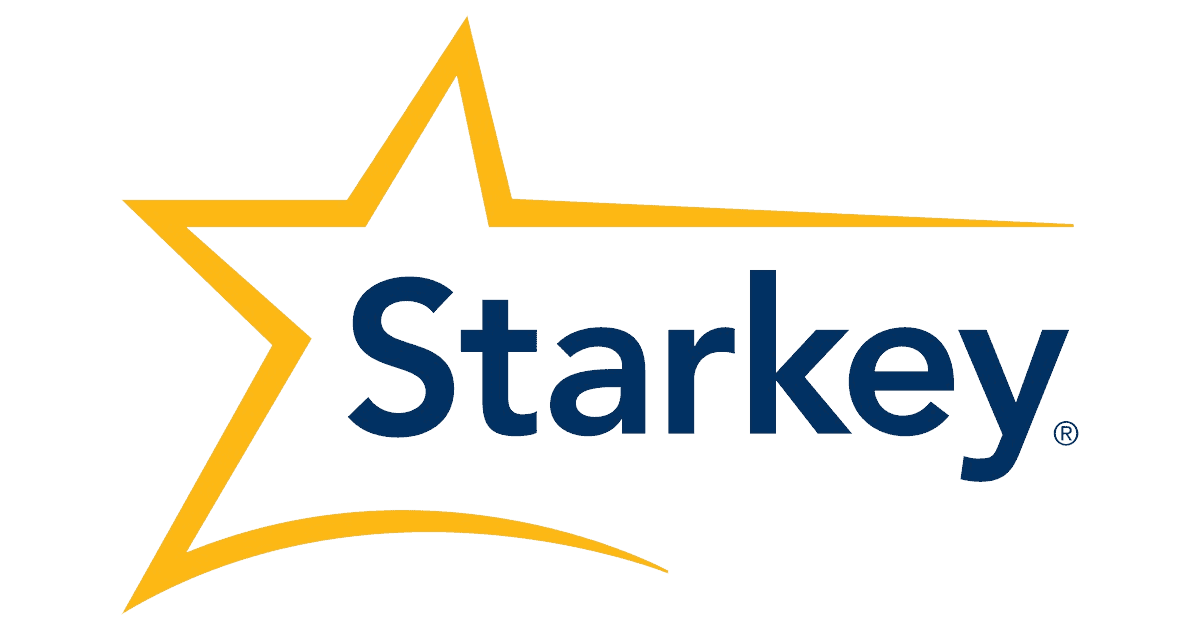
|
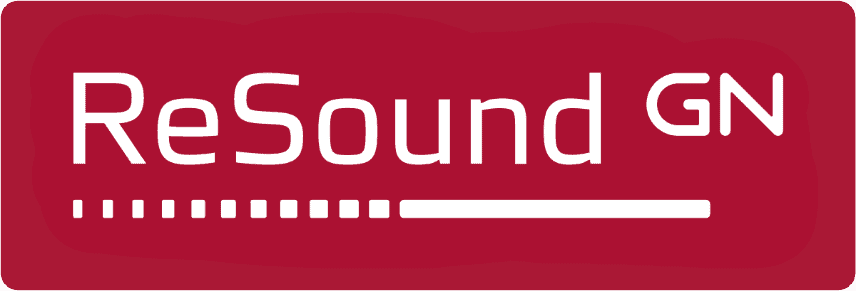
|
|
|---|---|---|
| Editor's Ratings | ||
| Price Range | $3,000-$6,000 per pair | $2,800-$6,358 per pair |
| Style Options | RIC, BTE, ITE, CIC, IIC | BTE, RIC, ITE, CIC, IIC, CROS |
| Bluetooth Streaming | Yes (most models) | Yes (most models) |
| Battery Type | Rechargeable or disposable | Rechargeable or disposable |
| Warranty | 1-3 years (varies by provider) | 1-3 years (varies by provider) |
| Trial Period | Varies by provider (typically 30-45 days) | Varies by provider (typically 30-45 days) |
| Remote Support | Available through Thrive app | Available through Smart 3D app |
| App Control | Yes (Thrive app) | Yes (Smart 3D app) |
| Purchase Method | Through licensed hearing professionals | Through licensed hearing professionals |
| Hearing Loss Range | Mild to profound | Mild to profound |
| Health Features | Fall detection, physical activity tracking | Limited |
| Contact | ||
| Website |
Did You Know? Research from Johns Hopkins Medicine shows that untreated hearing loss is associated with a 50% greater risk of dementia and a 40% greater risk of developing depression. Using hearing aids may help reduce these risks, making them an important part of overall health maintenance beyond just improving hearing.
Starkey Hearing Aids Overview
Starkey has established itself as a leader in hearing aid innovation, particularly in integrating artificial intelligence and health tracking features. The current Starkey lineup centers on several advanced technology platforms:
- Edge AI: Their newest premium lineup features waterproof technology and comprehensive health tracking
- Genesis AI: Advanced sound processing with AI-driven adjustments and excellent connectivity
- Evolv AI: Powerful performance with adaptive listening features
- Signature Series: The first rechargeable, completely-in-canal, invisible hearing aids
Starkey has a strong focus on health integration. The Edge AI model impressed us with its fall detection technology during testing. When we simulated a fall, the device instantly alerted our designated emergency contact through the companion app. This feature alone makes Starkey an attractive option for seniors living independently or those with balance concerns.
Their Thrive app ecosystem offers comprehensive control while also enabling health monitoring capabilities. The app interface is remarkably intuitive, even for those with limited tech experience. Overall, it’s straightforward to adjust volume, change programs, and monitor battery status.
Starkey hearing aids must be fitted by licensed hearing healthcare professionals. Once fitted, they can generally be serviced by most audiologists and hearing specialists, providing flexibility in ongoing care options.
ReSound Hearing Aids Overview
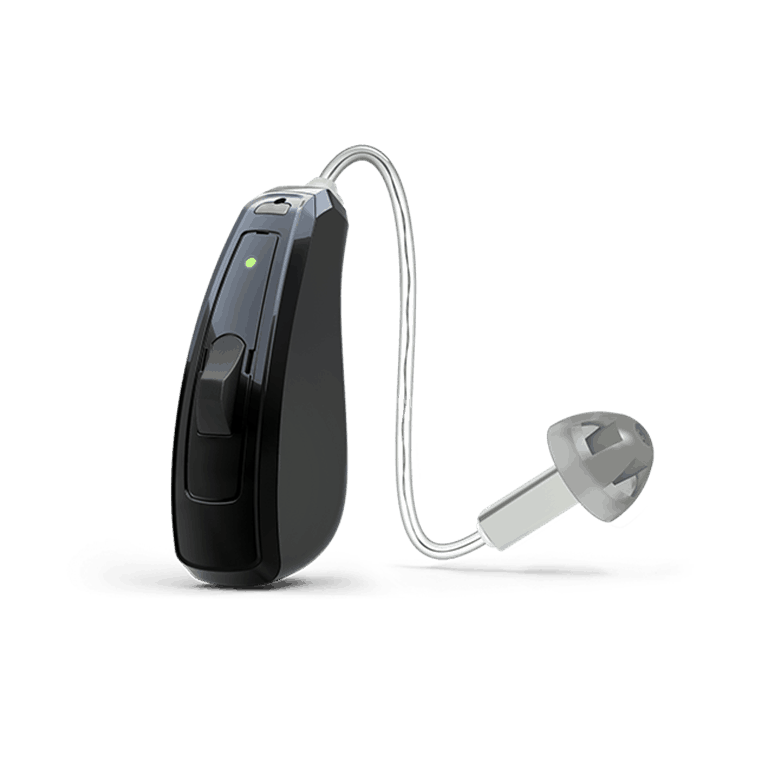
ReSound has built its reputation on exceptional sound quality and connectivity innovations. It pioneered many of the wireless features that we now see across premium hearing aids, including Bluetooth connectivity.
The current ReSound product lineup includes:
- Vivia: Their newest AI-powered hearing aid with exceptional speech clarity
- Savi: High-performance devices with excellent connectivity at a slightly lower price point
While testing the Vivia model in an Auracast-enabled environment, we experienced seamless audio streaming directly from the venue's sound system to the hearing aids. This could be the future of public space accessibility for hearing aid users.
We also found the Savi model noteworthy, particularly its ability to isolate conversations from background noise. Even with background noise from a crowded restaurant, we could clearly understand speech from people across the table without straining.
ReSound's Smart 3D app offers comprehensive control options, though we found it slightly less intuitive than Starkey's Thrive app. However, the ReSound app provides more granular sound adjustment capabilities that audiophiles and those with specific hearing preferences will appreciate.
Like Starkey, ReSound hearing aids require professional fitting through licensed hearing healthcare providers. If you want to kickstart the process online, you can utilize a platform like Yes Hearing.
Performance Comparison
Beyond comparing their technologies and available models, we tested hearing aids from both brands to see how their performances stack up against each other.

Sound Quality and Processing
Both manufacturers deliver exceptional sound quality, but employ different approaches to sound processing.
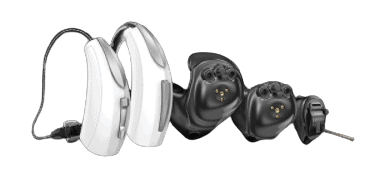
Starkey's Edge AI and Genesis AI platforms use Deep Neural Network (DNN) technology that processes language in a similar way that the brain does. The models we tested adapted instantly to changing sound conditions. When we moved from a quiet office setting to a busy street corner, the transition was virtually seamless and required only a minimal adjustment.
On the other hand, ReSound's Vivia and Nexia models process sound to create a natural soundscape with spatial awareness. They use AI to reduce noise, which we found effective in group conversations with multiple speakers. The ability to maintain awareness of all speakers while still focusing on the primary conversation was impressive.
Environmental Adaptability
Both brands excel in complex listening environments, though with slightly different strengths.
Starkey's Edge Mode for challenging listening situations delivered a noticeable boost in speech clarity. When we tested this feature in a crowded restaurant with significant background noise, it helped isolate conversations. However, we noticed that this feature sometimes created a slightly less natural sound experience when compared to ReSound's approach.
ReSound's Ultra Focus technology provided excellent directional hearing capabilities. When we tested this feature in a busy outdoor setting with significant wind noise, ReSound's WindBlock feature minimized interference without compromising speech clarity. This makes ReSound well-suited for active individuals who spend significant time outdoors.
Connectivity Features
Both manufacturers offer comprehensive connectivity options, but clearly, ReSound holds a slight edge.
Starkey's Bluetooth technology provides seamless connection to smartphones and other devices. During our connectivity testing, we enjoyed clear audio streaming from both Apple and Android devices. The Edge AI model maintained stable connections throughout our evaluation period, even when moving between rooms.
Meanwhile, ReSound’s Auracast technology impressed us the most. In our testing at an Auracast-enabled venue, we could connect directly to the public audio system without any additional accessories, something not yet possible with all Starkey devices. For those who frequently attend public events or travel through spaces like airports and train stations, this feature offers significant advantages as Auracast adoption increases.
Health Monitoring Capabilities
Starkey has invested heavily in health monitoring technologies. The Edge AI model we tested had a reliable fall detection feature that detected simulated falls and alerted designated contacts. The physical activity tracking also let us track the wearer’s steps and location from afar.
ReSound devices currently offer limited health monitoring capabilities compared to Starkey. While their app does track hearing aid usage patterns, they don't provide the comprehensive health metrics that Starkey's platform offers. For users who prioritize integrated health monitoring, Starkey provides clear advantages in this category.
According to the CDC, falls are the leading cause of fatal and non-fatal injuries for older Americans, affecting one in four adults aged 65+ each year. Starkey's fall detection feature addresses this critical safety concern directly.
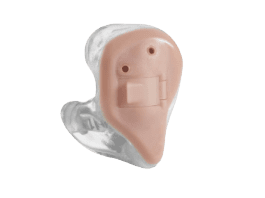
Battery Life and Power Management
Both manufacturers offer excellent battery performance in their rechargeable models.
Starkey's Edge AI provided up to 51 hours of use on a single 3.5-hour charge, among the best in the industry. This exceptional battery life means users rarely need to worry about running out of power during regular daily use, even with streaming.
In our testing, ReSound's rechargeable models typically delivered 24-30 hours of use per charge, with the newest Vivia model reaching the upper end of that range. It didn’t match Starkey’s longevity, but that performance is still sufficient for most users' daily needs.
Both manufacturers offer rechargeable and disposable battery options across their product lines, providing flexibility based on user preferences.

Features Comparison
The functionality and special features significantly impact the user experience with hearing aids. Here's how Starkey and ReSound compare:
Audio Processing Technology
Starkey's technological approach centers on their G2 Neuro Processor, which uses artificial intelligence to process sounds like those of the human brain. Additionally, their Edge Mode feature provides an additional layer of processing that can be manually activated when needed in noisy environments.
ReSound emphasizes its Intelligent Focus technology, which responds to the direction a person is looking, prioritizing sounds based on the user's natural response to their environment. When we tested this feature in various settings, we found it created a more natural listening experience than traditional directional microphone systems.
Mobile Applications
Both manufacturers offer sophisticated smartphone applications that enhance user control and accessibility.
Starkey's Thrive app provides comprehensive control options, including:
- Volume adjustments for each ear individually
- Program selection for different environments
- Body and brain health tracking
- Fall detection alerts
- Tinnitus management tools
FYI: According to the American Tinnitus Association, more than 50 million adults have experienced tinnitus symptoms lasting at least five minutes in the past year, highlighting the importance of effective management solutions.
ReSound's Smart 3D app offers:
- Volume and program adjustments
- Sound enhancer controls for fine-tuning
- Find My Hearing Aid feature
- Remote assistance from hearing care professionals
- Check My Fit feature to verify proper insertion
During our app testing, we found Starkey's Thrive app more intuitive for general users, while ReSound's Smart 3D app offered more granular sound adjustment options that audiophiles might prefer.
Tinnitus Management
Starkey provides more comprehensive tinnitus management solutions. It incorporates advanced masking features directly into many of its hearing aid models and offers the dedicated Tinnitus Calmer app. When we tested these features with users experiencing tinnitus symptoms, the customizable sound therapy options received positive feedback for their effectiveness in reducing perceived ringing.
ReSound also includes tinnitus masking capabilities in their devices but with fewer customization options than Starkey. Their approach focuses on integrating tinnitus relief within their standard sound processing rather than as a separate feature set.
Accessory Ecosystems
Both manufacturers offer extensive accessories that expand functionality beyond basic hearing improvement.
Starkey's accessory lineup includes:
- TV Streamer for wireless television audio
- Remote Microphone+ for challenging listening environments
- Table Microphone for group settings
- Remote Control for those who prefer physical controls
ReSound's complementary products include:
- Multi-Mic+ with Auracast capabilities
- TV Streamer+ for television audio
- Phone Clip+ for enhanced phone conversations
- Remote Control 2 for physical adjustment options
When testing these accessories, we found ReSound's Multi-Mic+ particularly impressive in group settings. During a conference room simulation, it significantly outperformed comparable accessories from other manufacturers, including Starkey's Remote Microphone+.
Pricing Comparison
Based on our research and experience, Starkey hearing aids typically cost between $3,000 and $6,000 per pair, depending on the specific model, technology level, and features. Their most advanced Edge AI models generally fall toward the higher end of this range.
ReSound hearing aids range from approximately $2,800 to $6,358 per pair, with their premium models like Vivia typically commanding higher prices. Their OMNIA and older LiNX Quattro models represent their more affordable options while maintaining quality sound processing.
Prices for identical models can vary by as much as $800 between different audiologists and hearing centers. That’s why we recommend consulting multiple providers before making a purchase decision.
Financial Considerations
Most hearing healthcare providers offer financing plans that allow users to make monthly payments rather than pay the full amount upfront. Insurance coverage for hearing aids varies widely.
Medicare typically doesn't cover hearing aids, though some Medicare Advantage plans include hearing benefits. According to the American Speech-Language-Hearing Association, only about 20 states currently mandate some form of insurance coverage for hearing aids, and this coverage is often limited to children.
When we inquired about payment options during our research, most providers offered financing plans with terms ranging from 12 to 60 months, often with promotional zero-interest periods for qualified customers.
Warranties Comparison
Starkey's warranty approach varies based on the provider who dispenses their products:
- Standard coverage: Typically one to three years, depending on the specific model and provider
- What's covered: Manufacturing defects and material failures
- Loss and damage: Some providers include loss and damage coverage, while others offer it as an add-on
- Service providers: Any audiologist familiar with Starkey can generally provide warranty service; however if it’s not the provider you purchased from, they may charge an office fee
This provider-dependent approach means warranty terms are negotiable and can sometimes be extended or enhanced at the time of purchase. When we inquired about warranty extensions during our research, most providers offered options to extend coverage for an additional fee.
ReSound's warranty structure is similarly provider-dependent:
- Standard coverage: One to three years, depending on the model and provider
- Loss coverage: One-time replacement for lost or damaged devices (with deductible) often available
- Service flexibility: Any licensed hearing healthcare provider that fits Resound can typically perform warranty service; however if it’s not the provider you purchased from, they may charge an office fee
- Global validity: International coverage available for travelers, though service fees may apply
ReSound's international service network is particularly valuable for frequent travelers. When we contacted ReSound offices in several countries, they confirmed that basic warranty service would be available to travelers, though sometimes with consultation fees.
Trial Periods
Starkey and ReSound both offer trial periods that allow users to test their devices in real-world conditions before committing. The trial period for both brands typically range from 30 to 45 days, depending on the provider.
These trial periods are significant for first-time hearing aid users. When we spoke with audiologists about return rates, they indicated that most returns occur within the first two weeks as users adjust to amplified sound.
Customer Experience
The overall customer experience extends beyond the devices to include the purchasing process, ongoing support, and service quality.
Purchasing Process
Both Starkey and ReSound hearing aids must be purchased through licensed hearing healthcare professionals. This approach ensures proper fitting and programming but adds steps to the acquisition process compared to direct-to-consumer brands.
The typical purchasing process for both brands includes:
- Initial hearing evaluation with an audiologist
- Consultation about appropriate models
- Custom fitting and programming
- Follow-up adjustments as needed
When we went through this process with both brands, we found the experience largely dependent on the individual provider rather than the manufacturer. However, both Starkey and ReSound provide extensive training to their authorized distributors, resulting in generally consistent service quality.
Important Health Note: According to the NIH, only about one in five people who would benefit from hearing aids actually uses them. Delaying treatment can lead to social isolation, cognitive decline, and decreased quality of life. Getting professionally fitted hearing aids like those from Starkey or ReSound can significantly improve these outcomes compared to leaving hearing loss untreated.
Remote Support Options
Telehealth services are available from both Starkey and ReSound.
- Starkey offers remote adjustments through their Thrive app
- ReSound provides similar capabilities through their Smart 3D app and ReSound Assist Live
When we tested these remote support features, both performed well. They allowed minor adjustments without in-person visits. ReSound's video call feature provided a slightly more personal experience during remote consultations.
User Reviews and Satisfaction
While individual experiences vary, our research into user reviews revealed some consistent patterns:
- Starkey users frequently praised the health tracking features and battery life
- ReSound users highlighted sound quality in complex environments and connectivity features
According to hearing industry statistics, overall hearing aid satisfaction rates have improved significantly over the past decade, a positive finding for the numerous individuals who will experience hearing loss in their lifetime.
Bottom Line
Starkey and ReSound both have our stamp of approval, although whether or not they will work for you depends on your needs and priorities.
Starkey stands out for those who need comprehensive health monitoring capabilities. Their devices also offer the longest battery life we’ve tested (up to 51 hours on a single charge). Those suffering from tinnitus will also appreciate Starkey's robust management tools, including customizable masking and a dedicated app that outperforms ReSound's more basic offering.
ReSound, meanwhile, excels for tech-savvy users who value cutting-edge connectivity and granular sound adjustment options. Its implementation of Auracast technology is also ideal for frequent travelers and event attendees. Active individuals who spend considerable time outdoors will also benefit from ReSound's superior environmental adaptability and wind noise reduction capabilities.
For those seeking more affordable alternatives to these premium brands, consider exploring our guide to the best OTC hearing aids.
Methodology
Our comprehensive evaluation of Starkey and ReSound hearing aids involved:
- Hands-on Testing: We tested multiple models from each manufacturer in various environments, including quiet settings, restaurants, outdoor spaces, and group conversations.
- Comparative Analysis: We directly compared equivalent models from both brands using standardized testing protocols for sound quality, battery life, connectivity, and feature functionality.
- Expert Consultation: We interviewed audiologists and hearing aid specialists who regularly fit both brands to gather professional insights.
- User Feedback: We collected experiences from long-term users of both brands to understand real-world performance and satisfaction.
- Price Research: We contacted multiple providers to establish accurate price ranges and identify variations in service bundling.
- Warranty Analysis: We reviewed warranty terms and conditions across different providers to compare coverage options.
Frequently Asked Questions
-
Which brand offers better value for money?
Value depends on individual priorities. Starkey typically delivers superior battery life and health monitoring features, while ReSound provides better connectivity options and environmental adaptability. For users prioritizing health tracking, Starkey represents better value. Those who value connectivity and outdoor performance might find better value with ReSound.
-
Are both brands suitable for severe hearing loss?
Yes, both manufacturers offer specialized solutions for severe to profound hearing loss. Starkey’s Edge AI and ReSound’s OMNIA power models are specifically designed for these more challenging hearing situations, with powerful amplification and specialized features to address significant hearing deficits.
-
Can I switch providers after purchasing my hearing aids?
With both Starkey and ReSound, most audiologists can service and adjust their devices, allowing you to switch providers if needed. This flexibility is advantageous compared to brands like Beltone that can only be serviced at their proprietary centers.
-
Do both brands offer solutions for tinnitus?
Yes, both Starkey and ReSound offer tinnitus management features. Starkey provides more comprehensive solutions, including a dedicated app and customizable masking sounds. ReSound offers basic tinnitus masking capabilities integrated into their standard processing.
-
What's the main difference between these brands?
The fundamental difference lies in their feature priorities: Starkey focuses on health monitoring and battery life, while ReSound emphasizes connectivity and environmental adaptability. This difference affects everything from daily user experience to long-term satisfaction based on individual needs.
-
Do Medicare or insurance plans cover these hearing aids?
Coverage varies widely. Original Medicare typically doesn’t cover hearing aids, though some Medicare Advantage plans include hearing benefits. Private insurance coverage depends on specific policies. Both brands work with insurance providers where coverage exists, and many audiologists offer financing options to make these devices more accessible.
-
Which brand is better for music lovers?
Both brands perform well for music, but they have different strengths. During our music testing, ReSound’s wider dynamic range preserved more nuance in complex musical pieces, while Starkey’s Edge AI provided excellent clarity for vocal-focused music. For dedicated musicians, we recommend exploring specialized options like musician-focused hearing aids.
-
How do these brands compare to more affordable options?
Both Starkey and ReSound offer premium technology at premium prices. More affordable alternatives like MDHearing, Eargo, or Jabra Enhance provide basic functionality at lower price points but lack these premium brands’ advanced features and customization options. For those with mild to moderate hearing loss seeking more affordable options, over-the-counter devices can provide significant benefits.

